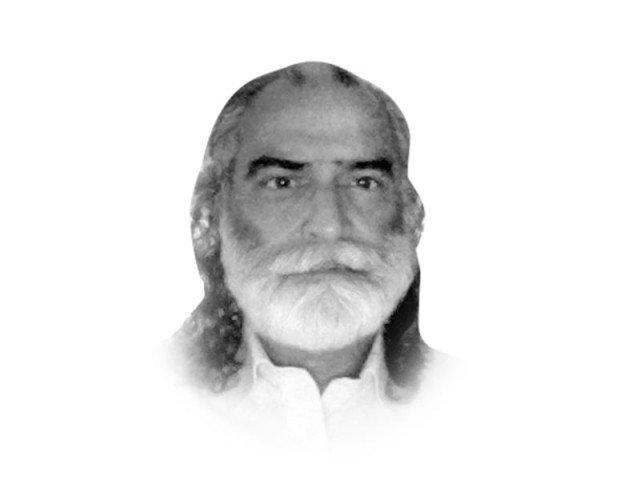In the name of local governance
Our elite appear to have always excelled in one area — propagating corrupt ideologies

The writer is a social activist who heads Pattan Development Organisation. The views expressed here are his own
One can draw many lessons from history. One of these is that wicked demagogues can fool millions of people for decades and perpetuate their farcical rule from generation to generation. But what pressures them into doing so? They do this simply to neutralise the opposition, as they know they are wrong. Thus, they need a noble excuse to fool people. Didn’t Rudyard Kipling’s poem “The White Man’s Burden” justify imperialism as a noble enterprise? It not only helped to build support for colonialism at home, but also among the ‘natives’ as many of them believed in this farce as well. Just consider these lines from Kipling’s poem: “To wait in heavy harness, on fluttered folk and wild/Your new-caught, sullen peoples, half-devil and half-child.” His poem clearly reflects the mindset and practices of invaders and colonisers.
In the age of transparency, accountability and free media, deceiving people in the name of a noble cause is not easy anymore. Therefore, sophisticated techniques of deception have become even more important for rulers. But when a ruler is over-confident, he may not even bother to adopt this approach.
In Pakistan, while civilian rulers, through the 18th Amendment, have devolved power to the provinces, they continued to refuse to devolve power to the grassroots level. This is a negation of their own election manifestoes and above all a violation of our Constitution, Article 140A of which states: “Each province shall, by law, establish a local government system and devolve political, administrative and financial responsibility and authority to the elected representatives of the local governments.”
The PML-N manifesto clearly endorses this Article as does clause 10 of the Charter of Democracy. Yet, both the PPP and the PML-N refused to hold local government elections till the Supreme Court plugged all escape roots for them. As the ‘danger’ posed by local government elections became inevitable, the ruling parties in Punjab and Sindh designed measures to prevent fragmentation and devolution of power to local councils. Unlike past practice, the electorate was denied to elect councillors of all local councils, a clear violation of the Constitution and democratic values.
In the 2001 and 2005 local government elections, voters had elected all union councillors, including women, minorities and workers/peasants. Ten years later, instead of democracy deepening at the local level, the PML-N government in Punjab and Islamabad has damaged it severely. Isn’t it terrible that an elected government deprives the electorate of its democratic right to vote in its representatives? Just consider this — eight directly elected union councillors will virtually appoint five more members on the women, minority and worker seats in order to complete the union council house. As a result, each union council will consist of nearly 40 per cent unelected members. This is indeed a highly peculiar and objectionable method.
The representation of marginalised groups of society i.e., women, minorities, the working class and the youth is being further marginalised by the system’s design. In other words, the PML-N government is bent upon reinforcing societal disparities and deprivations in modern state institutions. Interestingly, under General (retd) Musharraf’s local government system, the quota for poor segments of society were much bigger. Women had a 33 per cent quota in all councils; now they have less than half of that in the union councils. In the higher level councils, representation is reduced further still to eight per cent. Lahore, one of the most developed cities of Pakistan, has hundreds of well-known women working in the social, cultural and political fields. Sadly, the Lahore Metropolitan Corporation will only have 25 (7.8 per cent) female members of the total 319. Certainly, most of these women will be close relatives of the male members.
As far as minority representation goes, there will be just 10 minority members. We all know very well that indirectly ‘elected’ people don’t represent the public; they always defend interests of those who bring them to the councils/assemblies. Most of these will be cronies of PML-N stalwarts. No wonder, minority and women activists and their associations have been protesting across Punjab against the undemocratic nature of filling quota seats. Some of them have even challenged the law in the Lahore High Court.
Whilst democracy and gender development are in retreat in Pakistan, the US president admires and congratulates our prime minister for democratic progress. Isn’t that strange? Certainly, this provides huge confidence to our prime minister to ignore the grievances of Pakistani citizens and to continue with undemocratic practices, including depriving the public of the right to elect their local representatives. One only wishes President Obama could have imagined the damage his statement could cause to democratic development in our country. In such a situation, Pakistani rulers don’t need any noble excuse to hide their nefarious objectives.
Published in The Express Tribune, October 30th, 2015.
Like Opinion & Editorial on Facebook, follow @ETOpEd on Twitter to receive all updates on all our daily pieces.














COMMENTS
Comments are moderated and generally will be posted if they are on-topic and not abusive.
For more information, please see our Comments FAQ